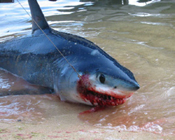Step Forward for International Shark Conservation
International Atlantic Tuna Commission agrees to reduce fishing for two threatened species; Conservationists warn higher priority and follow-up action needed

The Shark Alliance welcomes a landmark agreement by the International Commission for the Conservation of Atlantic Tunas (ICCAT) aimed at reducing fishing on North Atlantic shortfin mako and porbeagle sharks. ICCAT Members adopted the binding measure at their annual meeting, which wrapped up on Sunday. The international fisheries body failed to consider stronger protection for the porbeagle shark, considered endangered throughout the North Atlantic, but did direct its scientists to review the population’s status and develop conservation recommendations.
“ICCAT’s decision is a step forward on a long road to international shark conservation,” said Sonja Fordham, Shark Alliance Policy Director, who participated in the meeting. “The call for shark fishing cuts must be promptly heeded by Member countries and refined based on scientific assessments next year. Whereas we are pleased by the action, international fisheries bodies are still not offering sharks the high priority that is warranted by their biological vulnerability, poor status, and rising value. Complementary action through wildlife conventions and new, global agreements for sharks must also be pursued.”
A United States (US) proposal to reduce overall fishing mortality on overfished mako and porbeagle shark populations met with initial opposition from Canada and China. Canada had proposed weaker measures to cap shark fishing at current levels and was eventually successful in adding a clause that exempts Canadian shark fisheries. The final agreement directs ICCAT members without population assessments for porbeagles and North Atlantic shortfin mako sharks to reduce fishing for the species. The European Community (EC) voiced concern for porbeagle sharks. Mexico and Belize spoke in favor of taking action.
Porbeagle and mako sharks, highly migratory species closely related to the great white shark, are caught primarily in longline fisheries in the open ocean. Both are prized for their meat and fins and, as such, are targeted and often retained when taken incidentally. Such “bycatch” is not addressed in this year’s ICCAT Recommendation. ICCAT does require the reporting of shark catches, but most countries are not complying.
“Despite data gaps, we know that mako sharks make up an increasingly significant portion of Spanish longline catches and can no longer be brushed aside as only bycatch,” said Sandrine Polti, Oceana scientist who served as an observer to the meeting. “This vulnerable species is clearly now a target of fishermen and must be managed accordingly. The fact that countries like Spain, the top shark fishing nation in Europe, are not even reporting shark catches to ICCAT is simply appalling.”
Porbeagle sharks are targeted primarily by fishermen from France and Canada. Total porbeagle catches reported to ICCAT fell from roughly 2,500 metric tons (t) in 1994 to 500t in 2005, as populations declined. From 1997 to 2004, Spain reported annual shortfin mako catches far in excess of other ICCAT countries (approximately 3,000-4,000t). ICCAT statistics indicate Portugal had the highest catch of makos in 2006 (nearly 1,500t), but Spain did not report their shark catches for 2006 or 2005. The IUCN-World Conservation Union Shark Specialist Group (SSG) has concluded that both porbeagle and shortfin mako sharks are threatened with extinction due to overfishing.
Earlier this year, the EC, led by Germany, proposed to safeguard porbeagle sharks under the Convention on International Trade in Endangered Species (CITES). The proposal was defeated, primarily with arguments related to the lack of porbeagle catch limits in EC waters and the responsibility of international fisheries bodies, such as ICCAT, to manage shark fisheries.
“We are encouraged by the recent international attention to the plight of porbeagle sharks at CITES and ICCAT, but more concrete action is urgently needed,” said Heike Zidowitz, chair of the German shark science society who attended both the ICCAT and the CITES meetings. “It is now imperative that the EC demonstrate stated commitments to conserve the European porbeagle population, the most depleted in the world. EU Fisheries Ministers must agree at their meeting next month to end targeted porbeagle fishing and minimize bycatch, if we are to prevent irreparable harm to this exceptionally vulnerable population.”






